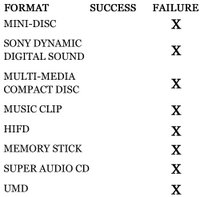
We can all agree that Sony has made some questionable decisions regarding the PlayStation 3. Sony was clearly the market leader last generation, smoking the competition to the tune of about 80 million units. With such unbridled success, it's difficult to imagine that only a few years from now the PS3 could end up either in the middle of or at the culmination of a downturn. DFC Intelligence analyst David Cole recently predicted that a
third-place finish could be conceivable, and a recent survey of Japanese developers indicates
waning faith in the console.
It still remains that all of this is conjecture and anything can still play out. The PS3 could hit the market and absolutely crush Microsoft and Nintendo, but since that scenario seems extremely unlikely I'm going to go ahead and play devil's advocate. Can Sony lose this war? Yes, and here's how.
Failure Selling to Early AdoptersThe importance of early adopters has never been so critical to a console manufacturer as it is to Sony with the PlayStation 3. Microsoft is losing a lot on the Xbox 360, but the company's financial health is in much better shape than Sony, who recently had to take out
nearly $700 million in loans to diversify their numerous expenses. On top of the cost to develop and manufacture Blu-ray, the CELL processor ($400 million in a joint operation with IBM), and the PlayStation 3, Sony also
owes the Japanese government $243 million due to faults with previous tax filings and
$90 million to Immersion Technologies for past royalties for the rumble technology in the PlayStation's DualShock controllers.

With nearly $1 billion in debt, Sony is spending an awful lot of money on the PS3 and Blu-ray technologies considering how poorly the company is doing. As aforementioned, Sony's current financial status is in the drain with their latest quarterly report posting
a $578 million loss including a loss in their game division - a division that years ago Sony depended upon for revenue. Their last quarter was also a milestone: the fifth consecutive year Sony has posted a loss in the final fiscal quarter.
Meanwhile in Microsoft's most recent quarterly report the company actually posted
revenue of $10.9 billion, and despite all the money the company has lost on the Xbox, its parent division, Home and Entertainment, also posted revenue...of
$1.056 billion.
Is there any wonder why Sony is selling the PS3 for so much money? The short answer is they have to! The tech inside the PS3 costs at least $900 to manufacture, so they're still selling the console at a loss (as expected). Selling the PS3 for any less at launch would be suicide. There are always early adopters, so while the console is expensive for your average consumer, you're banking on the fanboys, tech junkies, and upper middle-class consumers with some expendable cash to salvage as much from the wreckage as possible. Let's do some math, and for the record 9th grade algebra is about the ceiling in terms of my math skills.
Let's say Sony sells 3 million units of the $499 PS3 and 2 million units of the high-end $599 model. That's $2.7 billion net profit. The cost to produce those units, however (averaged to $900/unit), comes to $4.5 billion. Even my limited mathematical prowess can calculate that out to $1.8 billion lost on those 5 million units sold. If they went with the same SKUs as the 360? Another $1 billion down the drain.
If Sony doesn't sell at least 5 to 10 million units at its current SKUs, the PS3 can see some rough waters. At this point it's like Sony is knowingly playing Russian roulette with the bankruptcy gun.
[UPDATE] A friend of mine dug up some numbers of the amount of units sold through May '02, when the PS2 dropped its pricetag to $199.99. 9,514,000 PS2s were sold in North America by May '02, accounting for 22.7% of the 42 million PS2s sold in North America to date.
We could not find exact figures through May 2002 for Europe and Asia, but through 2002 Europe sold 13 million PS2s and Asia sold 11.5 million. At that same juncture North America sold 17 million PS2, with 7.5 million of those units selling after the price drop. So odds are the numbers through May '02 for Europe and Asia were probably around 7 million and 5.5 million respectively. That's roughly 75 to 80 percent of the 100 million PS2's sold worldwide coming after a pricedrop.
To build
on the comment below, perhaps the buying price for the mainstream consumer is $300. The success of the Xbox 360 shows at least some willingness of consumers to spend more due to inflation, but a $300 pricetag for the PS3 would only be reached after a massive price drop. Even $400 is kind of pushing it for someone not necessarily entrenched in the gaming scene. As much as Sony attests to the opposite, this is a game console and that's their largest market.
Sony is trying to go after a niche market this time - higher income consumers buying HDTV's and getting into the HD phenomenon - instead of releasing powerful, but not state of the art, hardware and feeding off their tremendous installed base like they did with the PS2. The repercussions of such a business strategy could be fatal over time.
Blu Ray's Failure to Become Standard Disc MediaSony has stated many, many, many times before that the PS3 is a great deal because it's like buying Blu-ray on the cheap. The question is, do you really want Blu-ray? Almost all of us have sunk a lot of cash into our DVD libraries and DVD has only been the standard since 2002 when major retailers began dropping VHS from the sales racks. Are we all really ready for a new format, especially one that isn't exactly backwards compatible with DVD? Though I have my issues with HD-DVD as well, at least it'd be a smoother transition.
In reality, the war for the HD format shouldn't even really start for about another five years, when consumers actually have the hardware to support the media. Right now
only 7 percent of U.S. households own an HDTV, and the speed with which HDTVs are adopted into the average home can't possibly be predicted. Even if 30 or 40 precent of U.S. households own HDTV's in five years, that still doesn't represent the majority of television owners. So of that 40 percent, it's likely that at least 75 percent of those HDTV owners would stick with the standard DVD format for at least a foreseeable future, leaving the rest segmented further between HD-DVD and Blu-ray.
Lest we forget Sony's history introducing new media formats.

Before you attest that UMD isn't dead, I'm not even going to bother linking the story of the studios saying it themselves. I'm going to let the
release calendar speak for itself.
If Blu-ray fails, it could mean Sony spent a lot of money to incorporate a technology that could've been substituted with the exponentially cheaper DVD format. The adult entertainment industry, a.k.a. porn, has widely accepted Blu-ray as their HD standard of choice. Porn did drive VHS, DVD, and digital distribution into the mainstream, so Sony's gotta pray people want to see some eroticism on the PS3.
Lack of Quality First-Party Software
While the PlayStation 2 did play host to several high quality first party games, it seems that strong internal development teams are of extreme importance in this round. Publishers have realized over the past few years that building games for the "lowest common denominator" platform and releasing near-identical ports on competing platforms increases visibility and revenue possibilities. Cross-platform development is extremely important to publishers looking to recoup the tens of millions they invest in developing game software, so it's imperative console manufacturers are able to develop first-party titles that differentiate their platforms from their competitors.
We already know Microsoft and Nintendo have pretty strong development teams, but Sony has been kind of hit or miss. The PS2 is a port-heavy console and if exclusives like Grand Theft Auto and Final Fantasy jump ship to the 360, then Sony won't really have many games to drive PS3 sales. GTA IV is already going to 360 on day one, and Square Enix could release Final Fantasy on the 360 if it wanted.
The PS3 Isn't Perceived as the Center of your Entertainment SystemSony truly believes the PlayStation 3 can be the center of your digital entertainment living room and it remains a key part of their strategy, but frankly, the 360 is in a much better position to accomplish this. Microsoft already has their Windows OS on every PC sold in retail stores and the Xbox 360 offers a lot of integration with PCs, especially those equipped with Windows Media Center Edition. The Xbox Live service is being used by over 50 percent of 360 owners, which opens a digital world to its users. You want downloadable HD content? You go it. You want new map packs and expansions? Just download them for a small fee.
Sony's online strategy hasn't been detailed despite the console's release now only four months down the road. They claim the system offers everything that 360 has including a marketplace, but Sony's experience with online marketplaces hasn't exactly been great. Case in point:
Sony Connect. Speaking in regards to Sony's place in the digital music market, an analyst speaking to CNet provides the following gem regarding the company.
"'Sony is still number two, three or four in almost every region, shipping millions of players,' said Envisioneering analyst Richard Doherty. 'It's the services side that has remained such a challenge for them.'"
The last sentence speaks volumes. Any home entertainment integration Sony may plan to do with the PlayStation 3 will have to come through separate applications on consumers' PCs. Sony would likely have to release separate software if it hopes to try to make it possible for users to transfer content from the PC to the PS3. Even worse is if Sony decides to make the PSP the transfer device that connects your PC and PS3. This would make the experience cumbersome, adding unnecessary expenses and steps to a process Microsoft already has built into your computer's standard functionality.

For years the PlayStation brand was Sony's cash cow while its other endeavors such as Vaio computers, Walkman portable music players, and Sony's several televisions such as Trinitron struggled to make any kind of money in competitive markets with better products from its competitors. Now it seems Sony is dragging its gaming division into the red as well. It's hard to envision a future for the PS3 as prosperous as the PlayStation's first 10 years.






